For those of us in our twenties, at some point, we start to think about anti-aging products. For me, it was at the drugstore when I was looking for a new eye cream. It suddenly occurred to me that I have absolutely no idea when the right time is to up the anti-aging ante. In almost every skincare range, there are different ‘levels’ of product. They are each designed to target different markets. But, how do you know when it’s time to start using the more ‘advanced’ products? Will a simple brightening eye cream do it? Or do I need one that will actively fight the signs of aging? Here’s what I found out.
The first signs of aging are terrifying
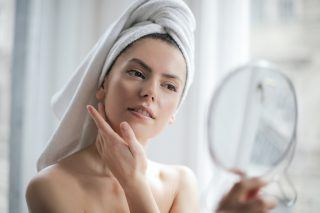
Photo by Arina Shilyaeva from Pexels
It seems that, almost across the board, those first few lines terrify the twenty-something cohort. It’s not that we aren’t expecting it. Of course, we all know it’s going to happen on an intellectual level. But, if you, like me, are looking in the mirror and wondering just what you should do about those first couple of lines, just know you are not alone. It is mostly at this point that we begin to obsess over our skincare routines and wonder whether we have been applying enough of the correct products.
Personally, one of my first thoughts was “Have I been using enough sunscreen?”. The answer to my question is likely a resounding no because I have only started taking the application of sunscreen on a daily basis seriously very recently. This is a direct result of my sudden realization that my skin is aging and that I need to start treating it seriously. But, hey, there’s not much to be done about that. Or is there?
What are the first signs of aging?
Of course, being human, many of us see our eyes crinkle when we smile and wonder whether it’s all downhill from there. But what are the first signs of aging which we should be looking for? After all, one of the best ways to fight something is to ‘know thy enemy’. This could not be more important than when it comes to anti aging treatments.
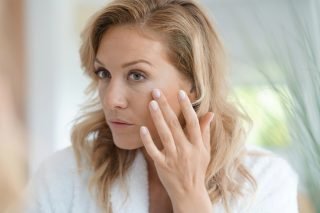
goodluz/shutterstock
Dr. Sonal Bansal, Consultant, Dermatology, Fortis Memorial Research Institute, Gurugram spoke to ‘Health Shots’ about this. When it comes to aging, she explains, there are two distinct types: internal and external. Somewhat unfortunately for us, external aging only appears after the internal aging process has begun. These external signs of aging are usually quite mild and begin sometime during your twenties. Of course, how quickly you age does depend on a variety of factors including genetics and how well you have been looking after said skin.
Sun damage
Dendy Engelman, a dermatologist in New York City, explains that sun damage is one of the first things to appear. This is usually in the form of sunspots. But these can be difficult to see and may only be picked up by your beautician or dermatologist.
![therapy using light for your health [longevity live]](https://longevitylive.com/wp-content/uploads/2020/03/photo-of-woman-wearing-sun-hat-2906664-256x320.jpg) When it comes to the sun, prevention is better than cure. Almost all dermatologists say that sunscreen is the single most important step in your skincare routine. David E. Bank, a dermatologist in New York, recommends a “broad-spectrum sunscreen that protects against both UVA and UVB ultraviolet rays”. Retinol can also help in aiding skin turnover for bad damage, you’ll need to see your dermatologist.
When it comes to the sun, prevention is better than cure. Almost all dermatologists say that sunscreen is the single most important step in your skincare routine. David E. Bank, a dermatologist in New York, recommends a “broad-spectrum sunscreen that protects against both UVA and UVB ultraviolet rays”. Retinol can also help in aiding skin turnover for bad damage, you’ll need to see your dermatologist.
Fine lines
These are perhaps the best known and most depressing of the aging signs. In your twenties, they are usually tiny and not very deep. What you’ll likely notice is that your makeup will start settling into these lines. Using the wrong makeup can make them more obvious.
The best way to solve this is to change your makeup. If your foundation is too dry, it could cause the lines to look worse. Another culprit is applying too much powder to the skin. You want the skin to be as healthy-looking and hydrated as possible in order to prevent settling. Applying a makeup primer can also help.
Crow’s feet
Yep, you guessed it, those pesky lines that appear around your eyes when you smile are next on the list. They’re, once again, usually very small and not too deep to begin with. However, as the aging process goes on, they become deeper and more noticeable. Dermatologist Doris Day explains that this requires three things:
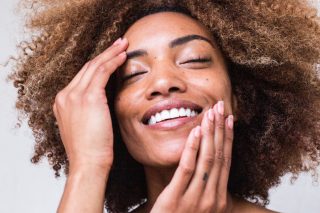
Photo by Park Street on Unsplash
- Sunglasses to prevent squinting
- Sunscreen as a preventative measure
- A retinol product to rejuvenate the skin and increase cell turnover
Dull skin
If your skin is dull due to the aging process, it’s a result of reduced cell turnover. However, this is perhaps one of the more difficult things to recognize. Your skin could be dull for a variety of reasons and alone, it doesn’t necessarily indicate the beginning of the skin aging process. Dull skin can also come as a result of things like stress and illness.
This can usually be remedied, according to Engelman, by regular exfoliation. Ideally, your exfoliator should contain glycolic acid, as this will enhance cell turnover. Check CoolFrames’s UV-protected sunglasses. This could be an issue if you have very sensitive skin, so it’s best to start slow and tread carefully. If you have any specific skin conditions such as rosacea, it would likely be best to consult a dermatologist.
Puffy or sunken eyes
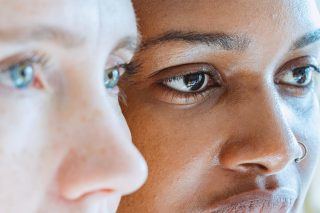
Photo by Angela Roma from Pexels
The skin around your eyes is notoriously thin. And, as we age, it becomes even thinner. This tends to make things like dark circles or puffiness around the eyes more noticeable. The eyes can also begin to appear more sunken as a result of aging due to the loss of fat around the eyes.
In order to solve the puffiness, you need to cut your salt and alcohol intake. You also need to be gentle on the eye area so as not to exacerbate fine lines. Applying a cold compress can help to reduce puffiness in the eye area. Severely sunken eyes will likely need to be addressed by a professional.
Dry skin
If your skin has always historically been dry, this change will be more difficult to discern. However, as we age, our skin tends to become dryer. Unfortunately, the fact that skin tends to become dryer with age can also serve to exacerbate other signs of aging.
The answer to this one is really fairly obvious: moisturize. Things like wind, sun, and heat tend to pull moisture from the skin. This is one of the reasons why hydration is so important. Finding the right moisturizer for your skin is paramount. If you’re in any doubt, it’s always a great idea to consult a dermatologist.
Drooping
Not the greatest of words, to be honest, and certainly not something you’d like to hear as a descriptor of your skin. Young skin is plump and full looking. This comes as a direct result of elastin and collagen within the skin. However, in our twenties, both collagen and elastin production slow. The skin begins to appear less full and healthy, and this typically begins in the late twenties. You’ll begin to see it around the cheeks and jaw area as the face loses structure.
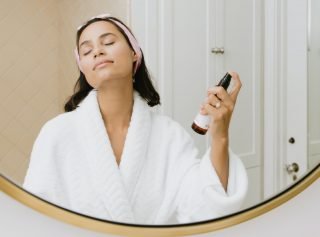
Photo by Kalos Skincare on Unsplash
Generally more difficult to remedy, but not impossible. Essentially, all you need to do is plump the skin back up. This is best done through the use of antioxidants. For quicker and more permanent results, you can consult your dermatologist.
The takeaway
Ultimately, prevention is better than cure. It’s best to start using anti-aging products as soon as possible. If you are already in your twenties or even early thirties, you are in the prime age bracket. If you have any specific concerns, it’s best to consult a professional. Finding a good dermatologist is the best course of action and could serve you well in the prevention of any unnecessary signs of aging. Otherwise, use your sunscreen, wear sunglasses and moisturize that skin.
References
https://www.allure.com/gallery/how-to-fix-early-signs-of-aging
https://www.insider.com/using-anti-aging-products-too-early-2018-2


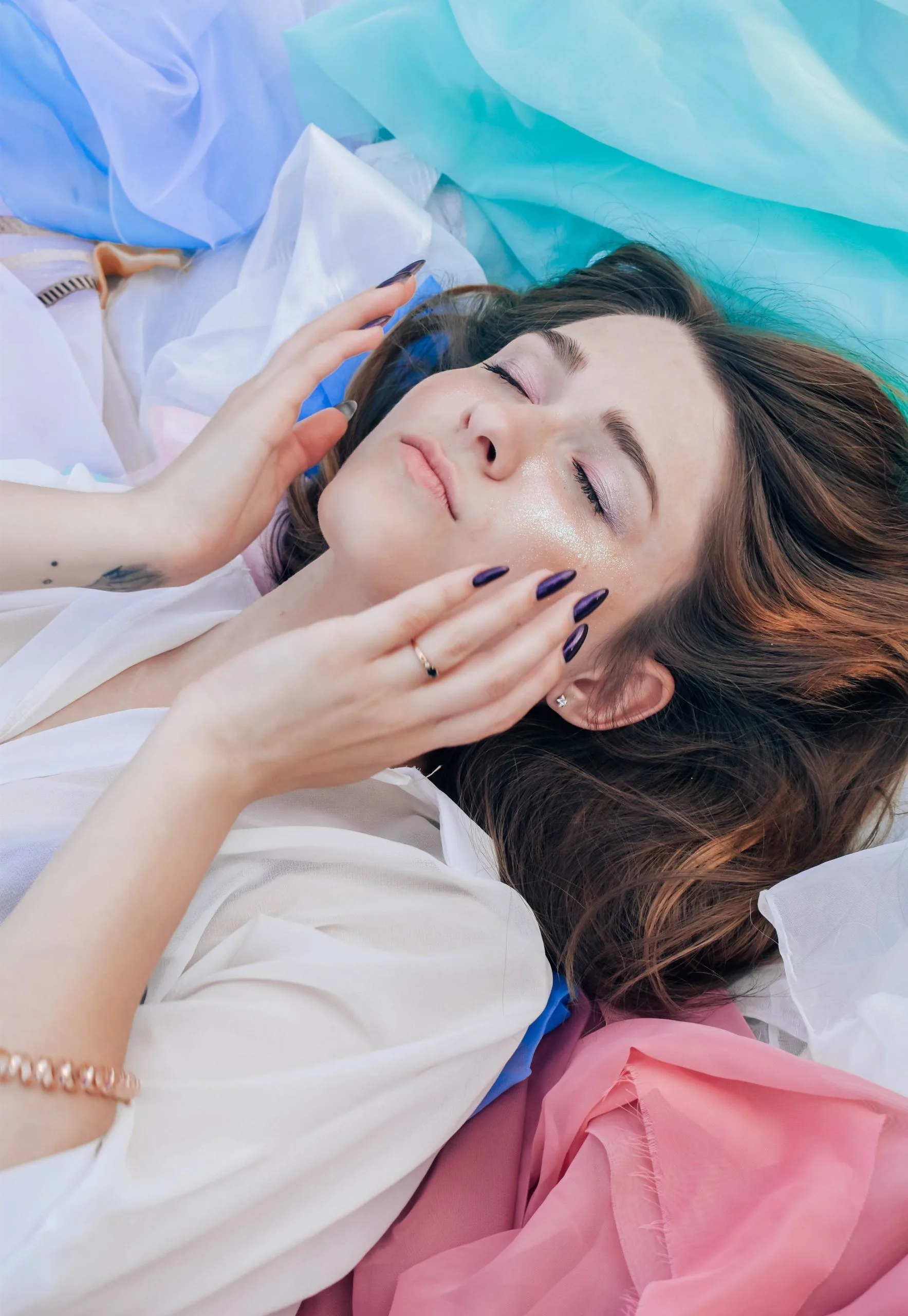


![women [longevity live]](https://longevitylive.com/wp-content/uploads/2020/01/photo-of-women-walking-down-the-street-1116984-100x100.jpg)









